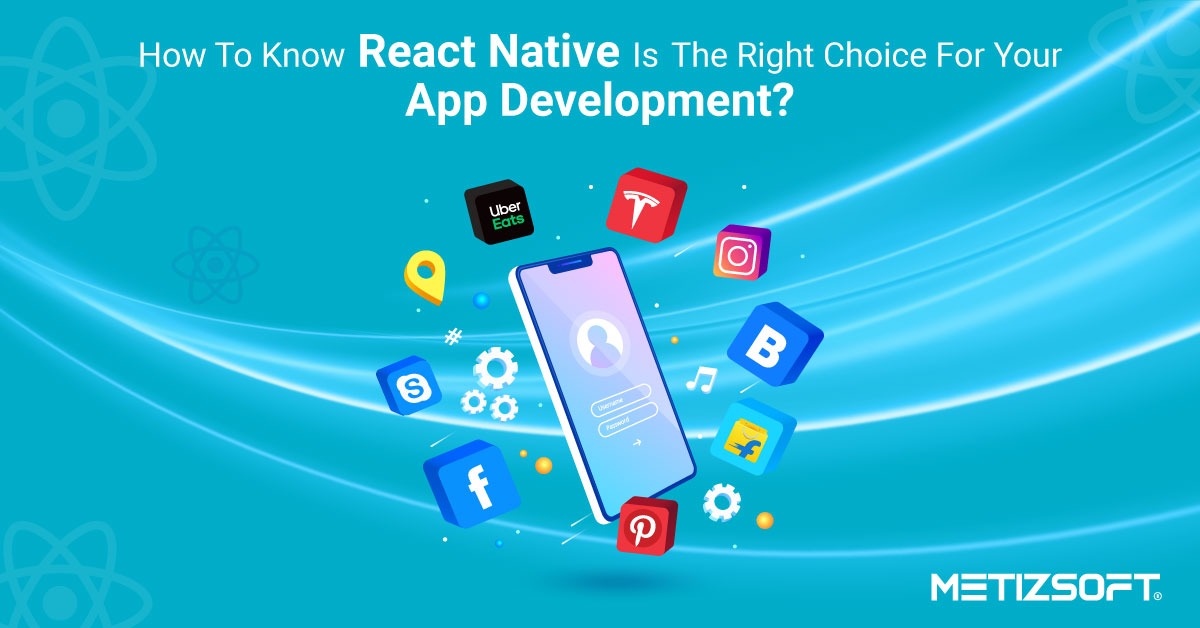
It’s a no-brainer that many of you are aware that Facebook was the one behind the release of React Native during its international hackathon back in 2015. Since then, this JavaScript-based, open-source framework has gained immense popularity amongst app development companies.
The core reason behind React Native’s adaptability in the last couple of years is its unisex nature. Developers can simultaneously use its one-code base configuration in Android and IOS without hassle.
Table of Contents
In this blog, we will answer all those questions arising in your mind regarding React Native development. So, consider reading till the end in detail.
What is React Native?
React Native is a JavaScript-based, open-source framework that allows developers to build high-performance native apps. It was developed with a one-code base that works both in Android and IOS.
This framework not only minimizes developers’ time but brings speed, efficiency, and flexibility in the most proactive manner.
Why Should You Consider React Native?
One of the prime reasons to stick with React Native in the first place is that it’s cheaper than many other frameworks and allows cross-platform functionality.
Regarding your Business need and app functionality, react-native could be a better choice than many. Even if your business model sticks around the development of AR, VR, and high-quality graphics, react native is the most reliant framework that will inevitably help the seamless integration of those apps.
How Does React Native Development Work?
As the above phrase indicates that React Native is a JavaScript-based open-source framework, it automates that the base of the significant code is JavaScript written.
By interpreting the JS thread into the JavaScript code, developers can leverage the libraries and end up developing a high-performance app that will best fit your business module.
Note: Although it is cross-platform specific, developers still need to create different APIs and modules suited to Android and IOs.
Advantages and disadvantages are part and parcel of any framework we use in real-time. Before considering any framework, one should know its pros and cons to avoid unnecessary malware functions. Let’s take a closer look at the pros and cons of the React Native Framework:
Advantages
- Time & Cost-Effective
React Native has numerous open-source libraries and pre-built components that reduce the code-writing process by 95%. It automatically saves both time and money and increases the development process.
- Cross-Platform Specific
React Native has one code configuration that works reliably well on Android and iOS. There is no specific code, only different libraries, and API components, and it saves both time and money for your firm.
- Helps You Create Great User-Interface
The better the UI of your business app, the more attention it will grab amongst users. Changing your UI is much easier in React Native than in any other framework comparatively from development to deployment.
- React Native Provides Easier Updates
Since its code is cross-platform-oriented, your developers should not worry about running separate updates. Once updated, the new version will be instantly available to both users, increasing performance on both devices.
- Maximizes Store Visibility
Since React Native’s codebase is compatible with multiple platforms, both users will be able to enjoy your app’s service at once. It will lead you to a more extensive customer base, and your business will grow immensely.
Disadvantages
- Custom Modules are Missing
Even though it’s been five years of its release, the React Native framework missed a few key modules that could make it inevitable compared to other frameworks. You need to hire react native developer for a full-fledged react native development process to cover it up.
- Updating Issue is Still There
React Native is written in the JavaScript programming language; there is no question about its flexibility and compatibility. But, when your application heavily relies on native components, you might get yourself into trouble while updating your application into react native.
- React Native is Not Entirely Native
Facebook might boast about creating a single codebase framework that works for both Android and IOs. But, React Native is partially native, if not 100% native. However, it still uses third-party plugins and is not equivalent to Kotlin (For Android) and Swift (For IOS) development.
- Framework Need Re-Work
React Native is faster, undoubtedly. But developers sometimes find it challenging to cope with the latest APIs and libraries due to their immature framework. They had to write a new code set complying with the libraries and APIs to deliver the best possible result to keep up the face.
How is React Native Compared to Other Frameworks?
As you know, React Native isn’t the only framework developers use in developing mobile apps. Other highly used technologies are Swift, Flutter, Ionic, Xamarin, and many more.
So, let’s run a comparative analysis of these with React Native:
React Native Vs. SWIFT
Swift is a product of Apple, and it was programmed to design and develop IOS-oriented products like MacBook, Apple Smart Watch, iPhone configuration, etc.
But, as you know, React Native can gradually work on both IOS and Android. Apart from the release date and copyrights, the only significant difference is that Swift is 100% native while React Native is partially native.
React Native Vs. Flutter
The only common phenomenon of both React Native and Flutter is that both are cross-platform application development frameworks.
While React Native is based on JavaScript, Flutter is built on Dart programming language.
Performances-wise, both possess similar capabilities, and the two significant differences are the release year and the brand behind it. React Native is a by-product of Facebook and Flutter belongs to Google.
React Native Vs. Ionic
Ionic is there on the internet since 2013. This open-source framework was released by Drifty co. Developers used this framework to develop mobile and progressive web apps (PWAs).
Unlike React Native, it uses HTML, CSS, and JavaScript simultaneously.
The only difference is the design and functionalities of UIs in both frameworks.
React Native Vs. Xamarin
When both Google and Facebook have their frameworks available for developers, how come Microsoft stays behind? Xamarin belongs to Microsoft.
Taking a step forward, Xamarin allows developers to build apps on all three primary OS, Android, IOs, and Windows.
Xamarin is developed by using C# and dot NET. Core developers prefer two powerful programming languages. React Native and Xamarin differ in performances apart from releasing years and brand owners.
As claimed, Xamarin slightly boosts performances compared to React Native.
Is React Native Worth For Your Business App Development?
Well, the above question comes with an exclamation mark, and it straightforwardly refers to your specific requirement and budget.
However, if you’re behind a faster, cheaper, and more reliable cross-platform framework, we suggest you go with React Native.
Many developers love building apps using React Native, and many small and mid-sized start-ups have adopted this technology to build fantastic apps.
In this competitive technology-driven world, having a business app is a mark of growth amongst competitors.
Along with a valuable customer base, it will help you generate ROI (Return On Investment) appropriately.
By the end, you are the decision-maker of your business. So we hope that we have got you covered, referring to whether you should consider using React Native for your business app development or not.
If in case, we missed some points that you want to discuss, we can assure you of assistance in your time of need.
Hire Metizsoft For Your Next React Native App Project.
For over a decade, Metizsoft Solutions helping its client with the best React Native app relevant to their business module. It’s one of the renowned React Native development companies in India.
Keeping in mind the advancement in technology, we have ensured the development to deployment of seamless integration.
We have the most prolific React Native App Development Team that assures complete assistance throughout the app development process.
Moreover, we innovate to match your expectations through our budget-friendly, deadline-specific process that will help you grow immensely both domestically and internationally.
AboutChetan Sheladiya
Related Posts
The New Flutter 2.2 Release- Here’s all you need to know about it.
Google announced Flutter 2.2, the latest version of their cross-platform app development framework, in a recent Google I/O...
What Importance Do Mobile Apps Play in The Success of Your Business?
As we know, mobile apps are dominating the market these days. We all have downloaded several mobile apps on our phones,...




